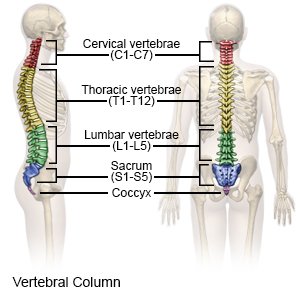Anterior Cervical Discectomy
Medically reviewed by Drugs.com. Last updated on Jul 7, 2024.
Anterior cervical discectomy is surgery to remove one or more cervical discs from your neck. A cervical disc is material that cushions and separates the vertebrae of your neck. The discs help your spine support your head and protect your spine from being damaged when you move.
 |
DISCHARGE INSTRUCTIONS:
Call your local emergency number (911 in the US) if:
- You suddenly feel lightheaded and have trouble breathing, or you cough up blood.
- You have chest pain or pain when you take a deep breath or cough.
- You have new or worsening trouble moving your neck, arms, or legs.
Call your doctor or surgeon if:
- Your bandage begins to soak with blood.
- Your surgery wound breaks open.
- You start leaking urine or bowel movement.
- Your arm or leg feels warm, tender, and painful. It may look swollen and red.
- You have a fever.
- You have a cough that does not go away.
- You have painful swelling in your neck and trouble swallowing.
- The skin around your surgical site is red, warm, or swollen.
- You have yellow or bad-smelling fluid coming from your wound.
- You have new or worsening trouble swallowing.
- You have new or worsening pain in your neck or arm.
- You have worsening hoarseness, or you have trouble speaking.
- You have questions or concerns about your condition or care.
Medicines:
- Prescription pain medicine may be given. Ask your healthcare provider how to take this medicine safely. Some prescription pain medicines contain acetaminophen. Do not take other medicines that contain acetaminophen without talking to your healthcare provider. Too much acetaminophen may cause liver damage. Prescription pain medicine may cause constipation. Ask your healthcare provider how to prevent or treat constipation.
- Take your medicine as directed. Contact your healthcare provider if you think your medicine is not helping or if you have side effects. Tell your provider if you are allergic to any medicine. Keep a list of the medicines, vitamins, and herbs you take. Include the amounts, and when and why you take them. Bring the list or the pill bottles to follow-up visits. Carry your medicine list with you in case of an emergency.
Activity:
You may be told to take many short walks after your surgery. Walking helps prevent blood clots. If you feel weak or dizzy, sit or lie down right away.
Neck brace:
You may need to wear a neck brace for a few weeks after your surgery. The brace will support your neck and hold it in the right position while you are healing. Do not stop wearing your neck brace until your healthcare provider says it is okay.
Physical therapy (PT):
A physical therapist will help you with exercises to decrease pain and improve movement. PT can also help improve strength in the muscles that support your neck and decrease your risk for loss of function.
Follow up with your doctor or surgeon as directed:
Tell your doctor or surgeon if you are having any pain or other symptoms. He or she may do a physical exam and check your muscle strength and reflexes. You may need tests such as a cervical spine x-ray, CT scan, or MRI to check the position of each vertebra. The tests will also show if your graft, plates, or screws have moved out of place. Ask how often you should clean your surgical wound and change your bandage. Write down your questions so you remember to ask them during your visits.
© Copyright Merative 2024 Information is for End User's use only and may not be sold, redistributed or otherwise used for commercial purposes.
The above information is an educational aid only. It is not intended as medical advice for individual conditions or treatments. Talk to your doctor, nurse or pharmacist before following any medical regimen to see if it is safe and effective for you.
Further information
Always consult your healthcare provider to ensure the information displayed on this page applies to your personal circumstances.
